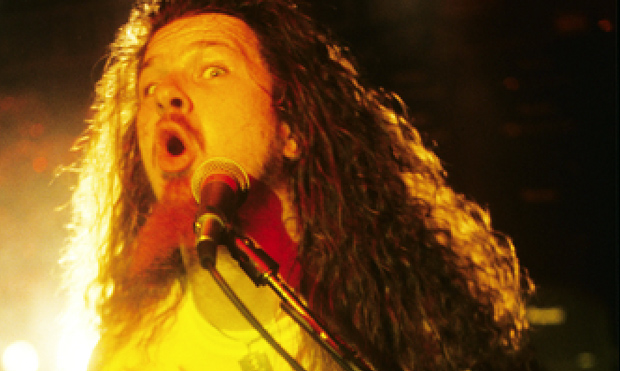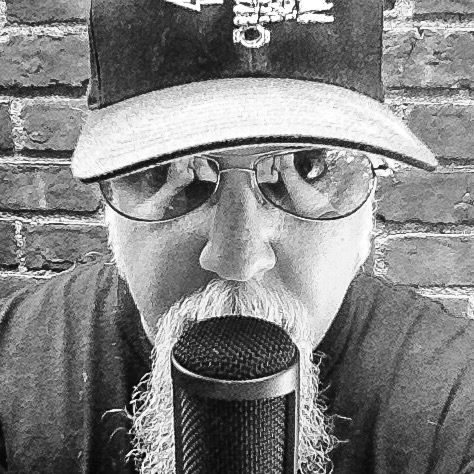Dimebag Darrell Talks 'Far Beyond Driven,' Amps and More: Previously Unreleased 1994 Interview

Guitar World presents a previously unpublished interview with Dimebag Darrell, conducted at his home in Arlington, Texas, on February 11, 1994, two months before the release of Far Beyond Driven.
Far Beyond Driven is much heavier than anything Pantera has released so far.
We’re into topping ourselves. Cowboys was Cowboys, and everybody thought that was real heavy. Then we did Vulgar and they said, “No way!” Now you’ve got Far Beyond Driven. Just for us to feel good about what we’re doing we need to top ourselves with each record. With most bands it’s usually the opposite. Every new record they come out with gets lighter and lighter. Then the fans are stuck with the first record, wishing and dreaming. That ain’t what we’re about.
Did the band write any songs while you were on tour?
The songs were all written in the studio. Everybody was like, “Hey man. You got a bunch of riffs?” and I was like, “No.” I had a couple of ideas, but mainly I had a vision of what this album was going to be. I think we all did, and we were all in the same vibe. We got together, had a good time, drank some beers, smoked some weed and wrote some songs. That’s exactly what happened. We knew what this album had to be, and that’s all it took.
We’d write the song, take a break, and as soon as we could make it through the whole passage, we’d get the tape rolling. A lot of times when we first go through it, we’ll say, “That’s cool.” We needed to go through a few songs again to tighten them up, but I pretty much kept my original guitar track that I played along with the drums on most of the tunes. Then I went back and recorded a double of that. Then we’d go write another song.
This is the third album you’ve recorded with Terry Date as the producer. What do you like about working with him?
Terry is a great overseer. He doesn’t tell us how to write our songs or how to play our instruments. He understands how we are and how we see our instruments and our music. All he does is get behind us and reinforce what we do. He doesn’t fuck with you or get in the way. He gets the best performances out of us. Terry focuses on what we’re after and helps us get it. He works with us. We weren’t tripping out on what he was doing to our sound. That’s the best thing. He’s a great dude and always an inspiration to be around. He and Vinnie do a lot of the production. When we’re getting tones and doing the final mixdown, the two of them are unbeatable.
It sounds like you recorded several layers of guitar tracks.
Believe it or not, it’s pretty much just doubled guitars panned to about three o’clock and nine o’clock. Some of the tracks are hard left and right with a triple up the center. That’s as thick as it got. I do some three-part harmonies on “Throes of Rejection” and “Hard Lines, Sunken Cheeks,” but I didn’t go overboard with it. Whenever I record more than two or three layers, it starts to get cluttered up and you can’t hear the cut of the guitars as good. It’s hard to get four guitars to hit at exactly the same time and keep the attack tight.
You are a big fan of solid-state amps. What do you like about them?
Solid-state to me is more in your face, while tube sounds like it’s surrounding your body. I’m not going for a soft sound. I ain’t lookin’ for a warm sound. My sound is warm, but I don’t need tubes to do it. The Randall RG-100 is the best amp for what I do. Randall made a tube amp that they sent out to me.
It sounded killer, but it wasn’t solid-state, so I’m going to stay with solid. To this day, when people find out that I use solid-state they’ll come up to me and go, “Are you sure? That sounds like tubes, dude.” The Randall has the warmth of tubes, but it has the chunk and the fuckin’ grind right in your face.
What are you listening to these days?
I love Dogman by King’s X and Living Colour’s Stain. I’ve been listening to Blues Saraceno too, but most of the time you’ll catch me listening to my old records. I’m old-school, dude. I’m into the new stuff, but I still listen to fuckin’ Van Halen to this day, old Kiss, Judas Priest, Ozzy with Randy Rhoads. I don’t have free time like I used to, where I could put on a record and not get bothered. People are always calling me or coming to my house. I’ve lived in the same spot too long and everybody knows where I live.
I also listen to things I’ve recorded myself. A lot of the stuff I do is bullshit on a four-track recorder. It’s usually an ongoing cycle of what’s happening in my life. If somebody catches on fire I’ll go out there and write a quick song about it. I’m always into layering guitars and putting sounds together and seeing how they fit with each other. I’ve got a killer system in my truck, so I’ll listen to a lot of those tapes when I’m driving around.
Pantera has recorded all of its albums at your dad’s studio. What is the advantage of doing that?
We feel real comfortable there, although we didn’t like the experience of the studio being in Nashville now and having to fly there. The people in Nashville are nice. They didn’t look at us funny, because they’re used to musicians with long hair, although maybe not ones with purple goatees. It was cool that we didn’t have a bunch of our friends coming to the studio sessions and hassling us, but we were living in a fuckin’ hotel. Fuck that shit. We do that on the road when we’re on tour. It wore a little thin on us, so we bailed out of there and came back to Dallas to finish guitar tracks and whatever else needed to be finished. We mixed the album at Dallas Sound Lab, and that was a breath of fresh air. We’re real happy with the album.
The grooves on this album are unlike anything else out there. Pantera has really developed its own sound.
Everybody is progressing. That’s what you’re supposed to do. We know what we’re doing. We don’t sit around and tell each other what to do. We might walk in and say, “What do you feel like today?” “Like shit. I’m fuckin’ hungover.” And then the song comes out like “Good Friends and a Bottle of Pills.”
That’s how we wrote that. We’re pretty spontaneous about most things we do. A lot of people always want to know why we do what we do, but we don’t plan anything. We just jam. That’s the bottom line when you listen to Pantera. If it ain’t jammin’ we’re wasting time.
Photo: Joe Giron
Get The Pick Newsletter
All the latest guitar news, interviews, lessons, reviews, deals and more, direct to your inbox!
Chris is the co-author of Eruption - Conversations with Eddie Van Halen. He is a 40-year music industry veteran who started at Boardwalk Entertainment (Joan Jett, Night Ranger) and Roland US before becoming a guitar journalist in 1991. He has interviewed more than 600 artists, written more than 1,400 product reviews and contributed to Jeff Beck’s Beck 01: Hot Rods and Rock & Roll and Eric Clapton’s Six String Stories.
“I wanted to play more, and it was inappropriate with Eric or Roger. I was not the lead guitarist, and I wanted to be”: Clapton, Waters, Satriani and me – Andy Fairweather Low on his greatest collaborations and finally taking center stage
Celebrated jazz guitarist George Freeman, best known for his work with Charlie Parker and Gene Ammons, has died aged 97

